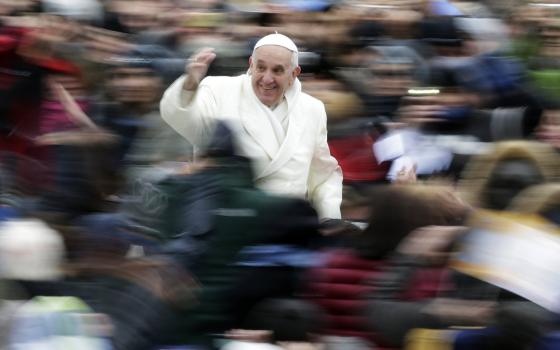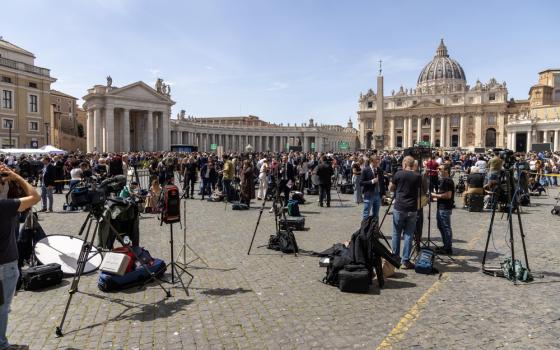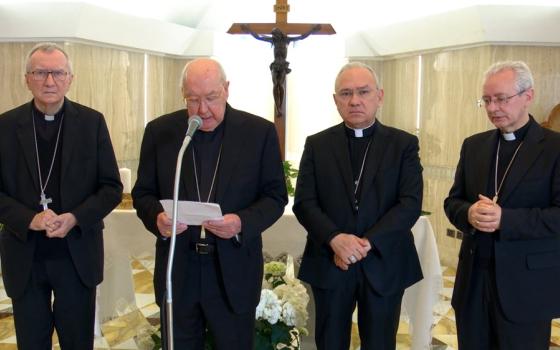"My column this week is a collection of personal comments," Archbishop Charles Chaput begins his weekly column in his archdiocesan newspaper. "Read it as thoughts from a brother in the faith, not as teachings from an archbishop." I wonder if all the "brothers in the faith" in the City of Brotherly Love get to have their "personal comments" so widely distributed? Of course, at no time is a bishop not a bishop, or a priest not a priest, so the idea that he can take off his miter and share "personal comments" is naïve at best.
This disclaimer raises a different question though: Why? Why does Archbishop Chaput feel the need to share these thoughts on politics which he seems to understand are not a fit object for his teaching authority? Does he think they are profound? Did he have trouble coming up with something to write about this week? Is there something that makes him crave controversy? This last characteristic is not a bad trait in a blogger, but in a bishop?
When we attend to the content of the archbishop's column the questions and concerns deepen and multiply. Archbishop Chaput writes:
Presidential campaigns typically hit full stride after Labor Day in an election year. But 2016 is a year in which two prominent Catholics - a sitting vice president, and the next vice presidential nominee of his party -- both seem to publicly ignore or invent the content of their Catholic faith as they go along.
My inner editor wishes to know what the first and second sentence have to do with one another. My inner analyst wants to know why Archbishop Chaput begins his column taking a swipe at Joe Biden and Tim Kaine? Did he hear Tim Kaine talk about the importance of faith in his life? Has he ever spoken with Biden about his faith? That faith may be in error as it pertains to some issues of public morality but the faith of these two men is undoubtedly real and important to them. Like Archbishop Chaput, I wish Kaine and Biden extended their obvious concern for the downtrodden to the unborn, but I can also discern the reasons they fail to do so, and those reasons do not add up to an "invention" of the content of their faith. They see the public application of their faith differently, and I think wrongly, but they are hardly charlatans.
Archbishop Chaput continues:
And meanwhile, both candidates for the nation's top residence, the White House, have astonishing flaws.
This is depressing and liberating at the same time. Depressing, because it's proof of how polarized the nation has become. Liberating, because for the honest voter, it's much easier this year to ignore the routine tribal loyalty chants of both the Democratic and Republican camps. I've been a registered independent for a long time and never more happily so than in this election season.
How does the perception that both candidates for the White House have astonishing flaws offer "proof of how polarized the nation has become." Could not that polarization be evidenced by candidates with less obvious flaws? Lincoln was no slacker, but he assumed the presidency at a time of enormous polarization. And, why do those flaws make it easier to "ignore the routine tribal loyalty chants" of the two parties? And, why is it ever hard for a bishop to "ignore the routine tribal loyalty chants" of the two parties? I thought that mostly came with the office.
The archbishop continues:
As Forbes magazine pointed out some months ago, the Republican candidate is worth roughly $4.5 billion. The Democratic candidate is worth roughly $45 million. Compare that with the average American household, which is worth about $144,000. The median U.S. income is about $56,000. Neither major candidate lives anywhere near the solar system where most Americans live, work and raise families. Nonetheless, we're asked to trust them.
The archbishop can travel a few blocks up the Benjamin Franklin Parkway from his cathedral to see a large equestrian statue of George Washington, or he can head the other direction to the statue of Washington in front of Independence Hall. Washington was a fabulously wealthy planter in his day. Did his wealth make him suspect? Theodore and Franklin Delano Roosevelt were from different branches of the same wealthy family. Did their wealth keep them from empathy with the life of the common man? Did the American people have trouble trusting any of these presidents because of their wealth? Why is the personal wealth of the candidates so important this time?
Then comes the second most troublesome part of the article. Archbishop Chaput compares the two presidential candidates, writing:
One candidate -- in the view of a lot of people -- is an eccentric businessman of defective ethics whose bombast and buffoonery make him inconceivable as president. And the other – in the view of a lot of people – should be under criminal indictment. The fact that she's not -- again, in the view of a lot of people -- proves Orwell's Animal Farm principle that "all animals are equal, but some are more equal than others."
First, I cannot ignore the qualifying phrase "in the view of a lot of people," not least this year when Mr. Donald Trump repeatedly uses a similar rhetorical device to avoid responsibility from spreading whichever ridiculous conspiracy theory comes out of his mouth after he intones, "Well, a lot of people think that. ..." We teach our children not to say things like that because it is morally irresponsible. To find such words in a column by a bishop is frankly shocking.
Second, there is no comparison between the two charges. Mr. Trump's eccentricity, his bombast and buffoonery, are all things about which any viewer can form an opinion. The charge of "defective ethics" is more difficult but still the kind of thing voters routinely need to assess about a candidate. The charge that Mrs. Hillary Clinton "should be under criminal indictment" is a matter for a trained, and empowered, prosecutor to make and, in Clinton's case, the relevant prosecutor, acting on the public advice of the Director of the FBI, James Comey, who said that no responsible prosecutor would indict Mrs. Clinton. Does Archbishop Chaput have information that Director Comey lacked? It is true that Republican Party surrogates have disparaged Comey's claim but has anyone any basis for refuting it?
Archbishop Chaput then pens what are to my mind the most regrettable paragraphs of the entire column. He writes:
So what are we to do this election cycle as Catholic voters? Note that by "Catholic," I mean people who take their faith seriously; people who actually believe what the Catholic faith holds to be true; people who place it first in their loyalty, thoughts and actions; people who submit their lives to Jesus Christ, to Scripture and to the guidance of the community of belief we know as the Church.
Anyone else who claims the Catholic label is simply fooling himself or herself -- and even more importantly, misleading others.
"I thank thee, Lord, that I am not like other men. ..." Apart from the general unattractiveness of finger-wagging, why this diversion from his main theme? Does the archbishop want to let the Catholics of Philadelphia know that he is on to them, that he knows which among them are not real Catholics, that they are fooling themselves? And who are these less-than-real Catholics? Those who do not see the world the way the archbishop sees it? Can you imagine Pope Francis writing this? He certainly challenges all of us, but never without words of encouragement and he reserves his harsh judgments for the clergy and the powerful, not for the people.
I call the attention of readers to one hopeful sentiment in this. Archbishop Chaput writes of those "who submit their lives to Jesus Christ, to Scripture and to the guidance of the community of belief we know as the Church." The Church recently offered guidance in the area of family life and marriage. That guidance took the form of the deliberations and resulting documents from two worldwide synods of bishops and a concluding Apostolic Exhortation by Pope Francis, Amoris Laetitia. Archbishop Chaput has issued "guidelines" for the implementation of Amoris Laetitia in his archdiocese. As I wrote at the time, those guidelines struck me as if they could have been written before the synods took place or Pope Francis wrote his exhortation. But, what do I know? Archbishop Joseph Kurtz appointed Archbishop Chaput to lead a committee of U.S. bishops to discuss the implementation of Amoris Laetitia.
We do know that Cardinal Christoph Schonborn, the Archbishop of Vienna, has emerged as the designated interpreter of Amoris Laetitia, and that Civilta Cattolica is running a series of essays on the document that re-affirm what the synods and the Holy Father intend. One such essay, by Fr. Antonio Spadaro, S.J. and Fr. Lou Cameli of the Archdiocese of Chicago, looks extensively at the issue of discernment in ways that are in stark contradistinction with both the tone and the content of Archbishop Chaput's guidelines, where in he only mentioned discernment once and that was when he was quoting the pope. I think that the principle of non-contradiction is too often invoked in ecclesiastical discussions, and that philosophic principles must be applied gently and even a bit loosely to messy human lives. Still, the two divergent interpretations cannot co-exist forever. I am betting it will become clear to all, if it is not already, that Archbishop Chaput is staking out a position at odds with the pope and the synods.
I admit that I find it tiresome to have to continually criticize Archbishop Chaput. I do so in sadness not in anger. But, it must be said: If I were writing a work of fiction and I wanted to create a caricature of a culture warrior bishop, I do not think I would have the courage to create one so reckless, so uncomplicated in his moral sensibilities (and not in a good way), and so quick to render judgment against others, so willing to ignore the pope, or to cite him, as it suits his own purposes, so intellectually thin and so edgily partisan, as Archbishop Chaput's columns show him to be.
[Michael Sean Winters is NCR Washington columnist and a visiting fellow at Catholic University's Institute for Policy Research and Catholic Studies.]




